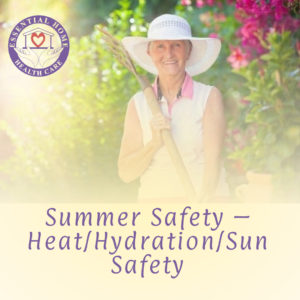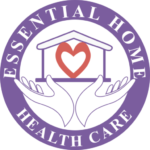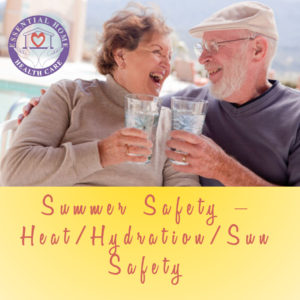Muscle cramping can indicate heart disease and lead to heat exhaustion or stroke.
Symptoms of Heat Exhaustion:
- Fatigue Sweating Cold
- Pale and clammy skin
- Thirsty fast
- Weak pulse
- Nausea or vomiting
What To Do:
- Get out of the heat.
- Lie down and relax.
- Apply cool, moist cloths to your entire body.
- Hydrate
Seek medical assistance if symptoms persist or worsen.
Heatstroke is serious. Symptoms May Include:
- Headache, dizziness, and trouble breathing
- Changes In Blood Pressure
- Nauseous
- High body Temp (103°F+)
- Hot, red flushed, dry, or moist skin
- Rapid and pulse
- Possible Unconsciousness
What To Do:
- This is a medical emergency- Call 911 Immediately.
- Move the person to a cooler place.
- Cool down the person using cool cloths or a bath.
- NO Fluids
Heat exhaustion is more likely in:
Heat-related disease increases with a heat index of 90 degrees or above. So, especially during heat waves, pay attention to the reported heat index, since the full sun can raise it by 15 degrees. Urban dwellers are more prone to heatstroke during a lengthy heatwave, especially if the air is stagnant and polluted. The “heat island effect” occurs when asphalt and concrete absorb heat during the day and slowly release it at night, resulting in warmer nights.
Muscle cramping can indicate heart disease and lead to heat exhaustion or stroke. Here’s how to spot heat exhaustion and heat stroke:
- People over 65 are less likely to detect and respond to temperature changes. The following information must be presented and recalled to this group.
- Because their CNS is not completely matured, children are more susceptible to heat sickness than adults.
- Homeowners without central air conditioning or sufficient ventilation
- anyone under the age of 18
- People on antihistamines and diuretics who have diabetes or health illness.
- excessive alcohol consumption
- Strenuous action
Kids can get heatstroke if left in a hot car for a few minutes, even with the windows cracked. Never leave a child alone in a vehicle.
Hydration
Did you know that feeling thirsty indicates mild dehydration? Using thirst as a cue to drink puts you in danger of dehydration. Instead, watch for these other indications of dehydration in children to ensure their safety: Staying hydrated in hot weather can help lower the risk of heat-related illness. Keep hydrated with water or sports drinks (with electrolytes) and try to stay in the shade or air-conditioned during the hottest periods of the afternoon.
Symptoms:
- Dizziness
- Dry mouth, no sweat
- Irritability
- sluggishness
- Yellow urine
- 12 hours of anuria (or 6 hours for infants)
- Awful weeping
- Eyes sunk
Treatment & Prevention
- Keeping hydrated is critical.
- Remember to drink, kids and adults.
- Offer fluids before a child expresses thirst. He is already dehydrated, so give him plenty of fluids before, during, and after going outside.
- Avoid intense activity during high solar hours to avoid fluid loss (10 am- 6 pm). Seek shade and rest often.
- Seek medical attention if you show signs of heat illness.
- Strenuous exertion and dehydration make it harder for young bodies to maintain body temperature.
Sunburn
- The Skin Cancer Foundation says one scorching sunburn as a child doubles your risk of melanoma.
- The American Academy of Dermatology advises everyone, adults and children alike, to use a water-resistant sunscreen that protects against both UVA and UVB radiation every day of the year. Yes, even in the winter.
- Apply sunscreen with at least SPF 30 15-30 minutes before going outside.
- Apply sunscreen as much as a shot glass full, and if using both sunscreen and bug repellant, apply the sunscreen first, then the repellent.
- Avoid sun exposure between 10 a.m. and 6 p.m.
- Wear protective gear, a hat, and sunglasses (with 99-100 percent UV protection).
Keep an eye on those who rely on you:
- Are they hydrated?
- Do they have access to AC?
- Can they keep cool?
- Keep to air-conditioned buildings. Contact your local health agency or find a cool place to stay.
- Drink more water and don’t wait till you’re thirsty.
- Let someone else check up on a friend or neighbor.
- Cooking on the stove or oven makes you and your home hotter.
- Dress in loose, light-colored attire.
- Relax with chilly showers or baths.
- Keep up with local health and safety news.
- Muscle cramps, headaches, nausea, and vomiting are all signs of heat-related sickness. Seek medical help immediately.
If this article helped you with your Summer Safety plans call our Medicare home healthcare Chicago firm at (847)813-6301 for more. You can also visit our site to learn how you can Help Your Children Get Healthy Habits and more.

